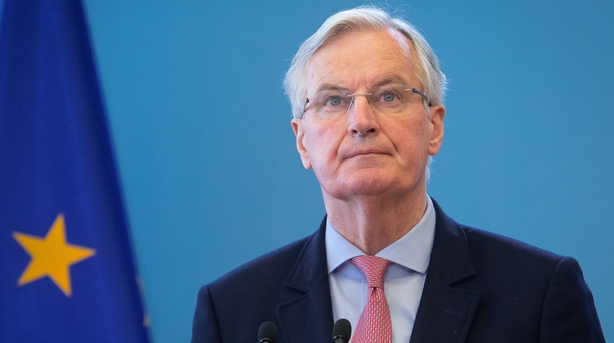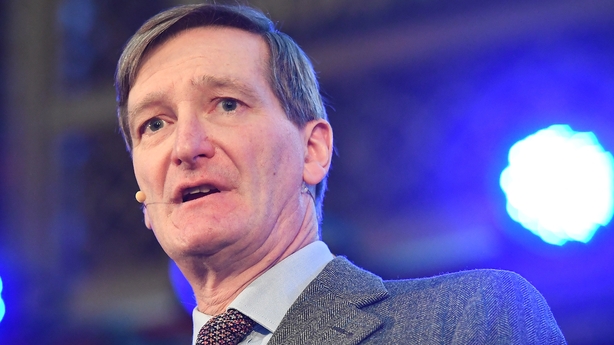British cabinet minister Michael Gove has refused to confirm the UK government would abide by legislation blocking a no-deal Brexit if it is forced through by Tory rebels and the opposition this week.
Mr Gove, who is in charge of no-deal preparations, also said that some food prices would increase in the event of withdrawal from the EU without an agreement with Brussels.
Pressed repeatedly on whether the government would abide by a successful bid by Commons opponents to pass legislation preventing a no-deal withdrawal on 31 October, Mr Gove told BBC One's The Andrew Marr Show: "Let's see what the legislation says.
"You're asking me about a pig in a poke.
"And I will wait to see what legislation the opposition may try to bring forward."
The comments come ahead of another pivotal week in the House of Commons and an expected clash when opponents of no-deal look set to try to seize control of the parliamentary agenda to push through legislation delaying Brexit beyond 31 October.
Labour's Brexit spokesperson Keir Starmer said Mr Gove's stance was "breathtaking".
He tweeted: "For ministers not to confirm that this government will accept and comply with legislation lawfully passed is breathtaking.
"The prime minister must make a statement on this straightaway. No government is above the law."
The European Union's top Brexit negotiator has said he was not optimistic about avoiding a no-deal scenario as the EU could not meet Britain's demands that the backstop is removed from the Withdrawal Agreement.

Writing in the Sunday Telegraph, Michel Barnier said that the backstop had to stay to protect the integrity of the EU's single market, while ensuring an open border on the island of Ireland.
"I am not optimistic about avoiding a no-deal scenario, but we should all continue to work with determination," Mr Barnier said.
"The backstop is the maximum amount of flexibility that the EU can offer to a non-member state."
"I am not optimistic about avoiding a no-deal scenario, but we should all continue to work with determination," Mr Barnier said.
"The backstop is the maximum amount of flexibility that the EU can offer to a non-member state."
Former UK Attorney General Dominic Grieve has said that if legislation aimed at stopping a no-deal Brexit is passed and Mr Johnson's government does not abide by it, then the government would face "serious consequences".
Speaking on RTÉ's This Week, the pro-remain MP also said a no-confidence vote on the issue could not be ruled out.
Reacting to Mr Gove's comments, Mr Grieve said the minister was engaging in "a delightful exercise in procrastination".
"If the legislation passes and becomes the law of the land, the government has to obey the law of the land, and if it doesn't obey the law of the land then it will face serious consequences. I think we'll cross that bridge when we get to it," he said.

"I'm fairly confident if the House of Commons moves to extend Article 50, then the government is simply going to have to comply, because they can't act unlawfully."
Leading Tory rebel and former justice minister David Gauke said he was holding discussions with Prime Minister Boris Johnson tomorrow regarding the Brexit agenda.
Mr Gauke told Sky News: "I want to hear from him as to what is his plan to deliver a deal.
"When are we putting forward proposals to deal with this backstop issue?
"And I want to hear how he plans to deliver the legislation if we get a deal by October 31, because at the moment, frankly, I can't see how he's got time to do that."
Referring to reports that Tories who oppose a no-deal option could lose the party whip, Mr Gauke said: "Sometimes there is a point where ... you have to judge between your own personal interests and the national interest.
"And the national interest has to come first.
"But, I hope it doesn't come to that, and I hope cooler and calmer heads will look at this and think that trying to split the Conservative Party in this way is not a sensible way forward for the Conservative Party, or indeed for the country."
Elsewhere, a UK commitment to indemnify the EU against single market infractions is among a set of alternative proposals to replace the backstop tabled by the Ulster Unionist Party.
The plan would also see the creation of a new offence in British law for knowingly transporting non-compliant goods to the EU.
The party has also proposed the establishment of a new cross-border body, similar to those already created by the Good Friday Agreement, to monitor and regulate trade across the frontier.
The UUP said it was putting forward the ideas in good faith, in a bid to break the impasse over the backstop.
Peer and former party leader Reg Empey, who took the lead in developing the proposals, said they represented an "Irish solution to an Irish problem".
"What we are trying to do is to stimulate a debate," he said.
"We need a solution. The roaring and shouting that has accompanied Boris Johnson's activities in the last period doesn't remove the need for a deal and it doesn't remove the need for a solution to the problem."
Mr Empey said his party recognised the right of the Irish Republic, and wider EU, to protect the integrity of the single market.

